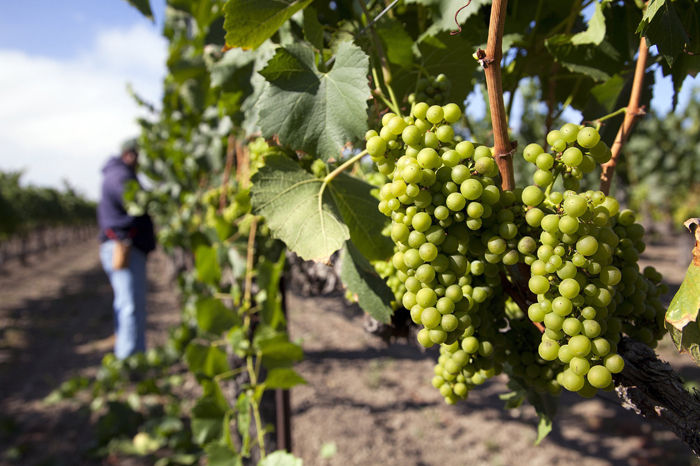Soaking in new wine practices
Retzlaff Winery vineyard manager and assistant winemaker Jose Hernandez trims the leaves off of grape vines to prevent mildew and make it easier to spray sulphur at Retzlaff Winery in Livermore, Calif., July 11, 2013.
October 9, 2015
WSU researchers are breaking traditions when it comes to irrigation during grape ripening.
Marcus Keller, a professor of viticulture, has been working with grape physiology and the impact of water around the globe.
Keller’s research impacts the wine industry by generating practical knowledge on how to determine when and how much to irrigate. Additionally, the knowledge will influence how people manage irrigation to improve the quality of wine grapes.
“Plant physiology studies every aspect of plant growth and development, the structures and functions of plant organs, and the interactions of plants with environment and humans”, said Yun Zhang, a postdoctoral research associate since August 2013.
Keller and Zhang are trying to educate European wine growers on the best time to water their crops. According to tradition, the assumption is that irrigation boosts berry size and dilutes the quality-impact components of the grapes. Therefore, growers are told not to irrigate during ripening to avoid lower quality fruit.
However, based on research in Eastern Washington, irrigation was found to increase ripening, said Keller. In the long term, is it also more beneficial to grape quality.
“With more knowledge on how to irrigate more efficiently, growers could potentially reduce the amount of water used for irrigation,” Zhang said. “Also, one benefit of deficit irrigation is the increased water use efficiency.”
Their research will help to prevent water waste and protect our environment, he said.
Keller is also currently studying the effect of cold weather on fruit. His research focuses on cold hardiness of grapes and how wine grapes are more sensitive to cold weather than other varieties.
He has recently developed a mathematical model to predict hardiness of plants at certain temperatures and how they will respond to the cold. The growers can log into an online account and access information on a daily basis in real time.
This model will help growers respond earlier to changes in weather and provide them the opportunity to protect their crops before it’s too late.
Keller is helping put together an international team that will continue to research solutions to minimize cold damage in fruit.
Another area that will be subjected to more studying is white grapes.
“There has been lots of information on the benefits of deficit irrigation, applying less water than what the vines would need so that they experience some degree of stress, on the quality of red wine grapes,” Zhang said. “But not much is known for white varieties on whether or not water stress is beneficial, and if so, how much stress.”
The knowledge created from the irrigation project, he said, will be used to help grower improve their own irrigation regimes and achieve better grape quality with a limited water supply.





















